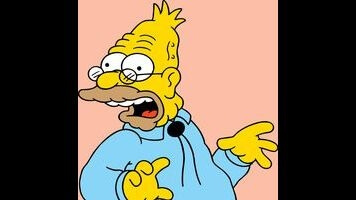The Simpsons head to Cuba for some forgettable medical care

When the Simpsons go a-traveling, things can go wrong pretty quickly. Not in the sense of them wrecking up the joint, because that’s going to happen, and that’s what we expect, and sort of want. But in the sense of the story becoming little more than a sludge of ethnic jokes and stereotypes in lieu of having anything interesting to say about the characters, the location, or the idea of the “typical American family” interacting with other cultures. For every sublimely, deliberately ridiculous exaggeration for comic effect, there’s been a lazy outing where it seems like the writers were just raiding travel brochures, stale ethnic joke books, and memories of that time one of them went to that one country for a week.
“Havana Wild Weekend,” in which the family takes Grandpa to Cuba for cheap medical care for his advanced case of old, really does neither of these things. In point of fact, it doesn’t do much of anything at all, as Abe gets his groove back thanks to Cuba’s 1950s cars, becomes embroiled in both a criminal scheme and some light espionage, and Homer watches some communist propaganda, all without anyone sweating through their pastel vacation casualwear.
The script is credited to first-time Simpsons writer Peter Tilden and husband-and-wife Simpsons royalty Dan Castellaneta and Deb Lacusta, screenwriting vets of eight episodes now. Things start out in Springfield, where Abe confesses that he, not Santa’s Little Helper, had an accident on the floor. Heading to the V.A. Hospital (where the wait is 23 years), they hear from an old army buddy that treatment costing $2000 here costs 6 bucks in Cuba. (“This is true people! Everybody head there!,” advises the onscreen graphic.) So it’s off to sunny, jazz-loving Cuba (“Thanks for the warning, Lisa,” Homer says earnestly), where, sadly, Abe’s old age isn’t any more curable. (The kind doctor does loan them a nice parrot shirt for him to wear until, you know.)
Abraham Simpson’s a walking joke, but it’s still a fairly potent joke. Like the Simpsons themselves, The Simpsons generally only remembers Grandpa exists when there’s a need for a plot-advancing incompetent babysitter or a string of prime, old-timey comic gibberish, a utilitarian view of the guy that underscores the series-long dark comedy about how, in America, our elders are often shunted out of our lives as soon as they become inconvenient. (“I’ve been paying you off and on for years and there’s nothing you can do to help?,” rails Homer at the uncaring nurse at the Springfield Retirement Castle.) Every few years, there’s a stab at an Abe-centric episode, some of which have been genuinely funny and or touching in how they examine how an aging family member finds some meaning in his waning existence. (“Dignity’s on me, friends” is one of the classic Simpsons quotes guaranteed to make me get all choked up.)
So watching Abe rediscover some joy in living at the sight of a 1950s American car with “little triangle windows that weren’t good for nothin’” and a lungful of leaded gas fumes is nice. Seeing Abe flirt with a bar matron, Isabella (voiced by Lacusta) and reconnect with another army buddy with plans to turn an old, oft-hijacked airliner into an illegal nightclub is nice. Even the big blowoff, where Isabella turns out to be a CIA agent flying the planeload of sleep-gassed miscreants back to America (along with the Simpsons) is nice, as Abe, before getting the final brushoff, gets to share one spirited dance with his new faux girlfriend. (And played by the married Castellaneta and Lacusta, it’s especially sweet.) It’s nice, is what I’m saying.
But it’s all awfully forgettable, too. The expected Simpsons’ culture clash jokes barely register. Sure, Homer gets all worked up about Angola from watching Castro, but it never comes to anything. And Lisa is demoted to correcting Bart’s Spanish (“You’re using informal Spanish with someone who’s not a family member!” “Ay, caramba!”), while Marge never even gets to effectively tut-tut at something unfamiliar.
Meanwhile, Homer finds out that every AARP card comes with a secret tracking chip, there’s an I Love Lucy runner for the reason that Ricky was Cuban and Dan Castellaneta grew up watching that show, one supposes, and the expected father-son rapprochement is rushed and perfunctory. I did feel Abe’s sorrowful “Like every good thing in life, I’ve already forgotten it” upon touching down back in the States. But in the long and storied history of Simpsons travelogues, ”Havana Wild Weekend” is as sure to be forgotten as is poor old Abe.
Stray observations
- Both Homer and Abe take an immediate poke at the guy who came up with Ticketmaster. Homer, after being introduced first to a major drug trafficker, knocks out Ticketmaster guy with a furious “You charge me to sell me something!” and then politely shakes the drug dealer’s hand.
- Clever joke: Bart applies his signature “El Barto” graffiti as “The Bart” in Spanish-speaking Cuba.
- Now entering Cuba: Russia’s Hawaii.
- Marge, looking through the Cuban guidebook: “We can visit Mariel Hemingway’s grandfather’s house!”
- Abe envisions how Homer sees him as a bag of “smelly anvils.”
- It’s refreshing overall that the family doesn’t mock Abe for his incontinence, Marge swooping in to settle him on the couch, but not before surreptitiously laying some newspapers down first.
- There’s a Shark Tank joke because that’s a show that exists. I did like Kirk’s pathetically resigned “Thank you for the opportunity…” as he and Milhouse fall through Mr. Burns’ trap door.
- Lisa, shocked at how shabbily veterans are treated at the V.A. cries out “This is America’s shame!” “A lot of things are America’s shame honey,” placates Homer.
- The first post-election joke: Bart’s chalkboard reads “Being right sucks” in reference to the show’s “joke” about a Trump presidency.